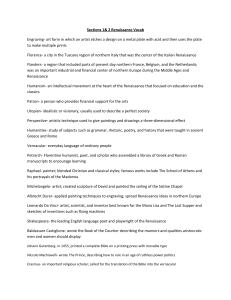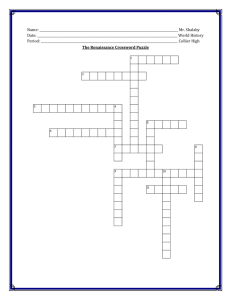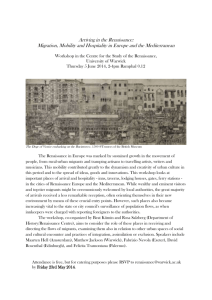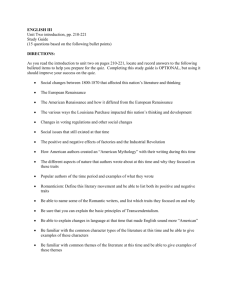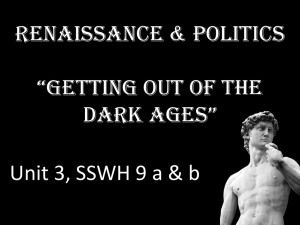Call for papers Forthcoming conference on `Primitive Renaissance
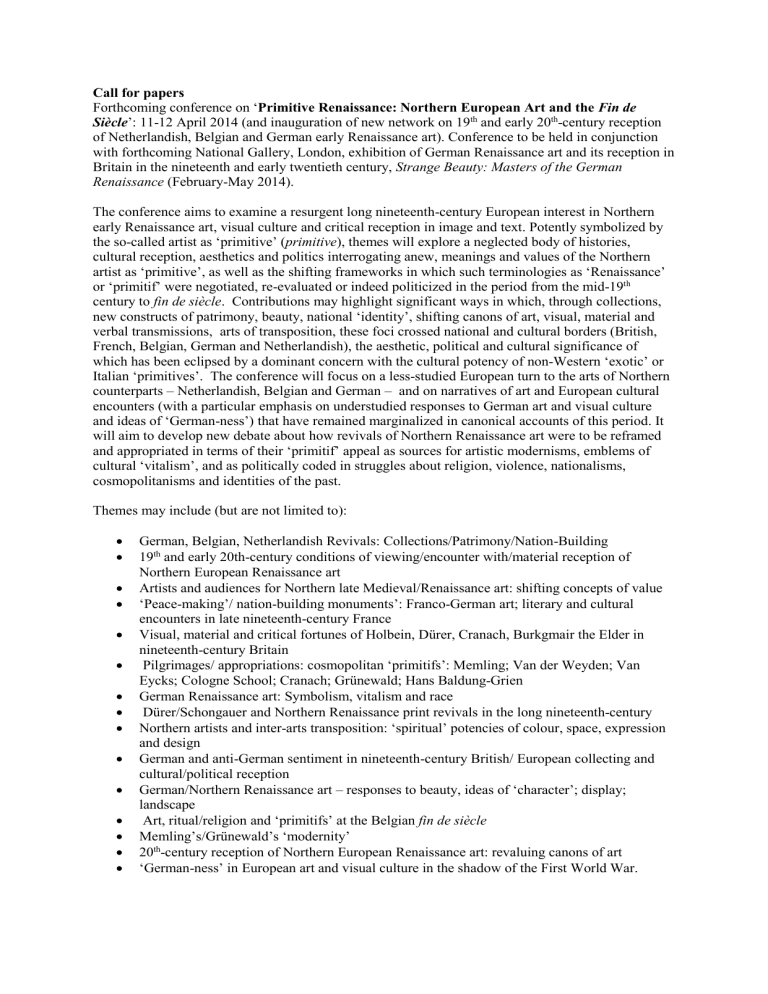
Call for papers
Forthcoming conference on ‘ Primitive Renaissance: Northern European Art and the Fin de
Siècle ’: 11-12 April 2014 (and inauguration of new network on 19 th and early 20 th -century reception of Netherlandish, Belgian and German early Renaissance art). Conference to be held in conjunction with forthcoming National Gallery, London, exhibition of German Renaissance art and its reception in
Britain in the nineteenth and early twentieth century, Strange Beauty: Masters of the German
Renaissance (February-May 2014).
The conference aims to examine a resurgent long nineteenth-century European interest in Northern early Renaissance art, visual culture and critical reception in image and text. Potently symbolized by the so-called artist as ‘primitive’ ( primitive ), themes will explore a neglected body of histories, cultural reception, aesthetics and politics interrogating anew, meanings and values of the Northern artist as ‘primitive’, as well as the shifting frameworks in which such terminologies as ‘Renaissance’ or ‘primitif’ were negotiated, re-evaluated or indeed politicized in the period from the mid-19 th century to fin de siècle . Contributions may highlight significant ways in which, through collections, new constructs of patrimony, beauty, national ‘identity’, shifting canons of art, visual, material and verbal transmissions, arts of transposition, these foci crossed national and cultural borders (British,
French, Belgian, German and Netherlandish), the aesthetic, political and cultural significance of which has been eclipsed by a dominant concern with the cultural potency of non-Western ‘exotic’ or
Italian ‘primitives’. The conference will focus on a less-studied European turn to the arts of Northern counterparts – Netherlandish, Belgian and German – and on narratives of art and European cultural encounters (with a particular emphasis on understudied responses to German art and visual culture and ideas of ‘German-ness’) that have remained marginalized in canonical accounts of this period. It will aim to develop new debate about how revivals of Northern Renaissance art were to be reframed and appropriated in terms of their ‘primitif’ appeal as sources for artistic modernisms, emblems of cultural ‘vitalism’, and as politically coded in struggles about religion, violence, nationalisms, cosmopolitanisms and identities of the past.
Themes may include (but are not limited to):
German, Belgian, Netherlandish Revivals: Collections/Patrimony/Nation-Building
19 th and early 20th-century conditions of viewing/encounter with/material reception of
Northern European Renaissance art
Artists and audiences for Northern late Medieval/Renaissance art: shifting concepts of value
‘Peace-making’/ nation-building monuments’: Franco-German art; literary and cultural encounters in late nineteenth-century France
Visual, material and critical fortunes of Holbein, Dürer, Cranach, Burkgmair the Elder in nineteenth-century Britain
Pilgrimages/ appropriations: cosmopolitan ‘primitifs’: Memling; Van der Weyden; Van
Eycks; Cologne School; Cranach; Grünewald; Hans Baldung-Grien
German Renaissance art: Symbolism, vitalism and race
Dürer/Schongauer and Northern Renaissance print revivals in the long nineteenth-century
Northern artists and inter-arts transposition: ‘spiritual’ potencies of colour, space, expression and design
German and anti-German sentiment in nineteenth-century British/ European collecting and cultural/political reception
German/Northern Renaissance art – responses to beauty, ideas of ‘character’; display; landscape
Art, ritual/religion and ‘primitifs’ at the Belgian fin de siècle
Memling’s/Grünewald’s ‘modernity’
20 th -century reception of Northern European Renaissance art: revaluing canons of art
‘German-ness’ in European art and visual culture in the shadow of the First World War.
Papers should be 30 minutes in length. Speakers will be offered expenses to cover reasonable travel costs or contributions towards accommodation. Please send indicative title and short abstract by
15 November 2013.
Juliet Simpson
Professor of Art History and Visual Culture
School of Visual Arts and Design
Buckinghamshire New University, HP11 2JZ
UK
E: jsimps01@bucks.ac.uk
In collaboration with
The University of York
The National Gallery, London


